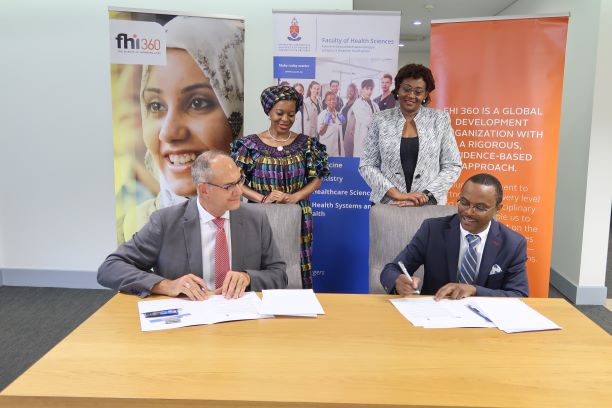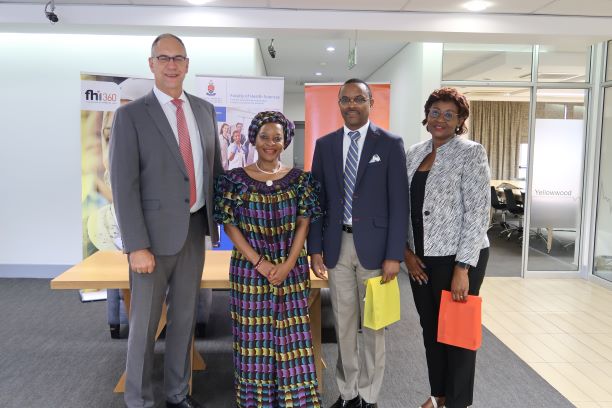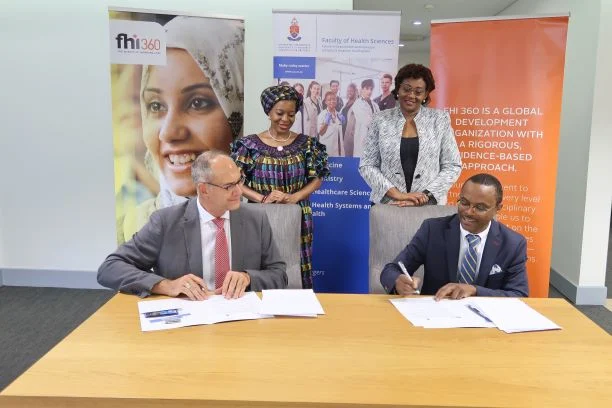University of Pretoria Collaborates with FHI 360 to Advance Public Health Research
On April 11, 2024, the University of Pretoria’s Faculty of Health Sciences and Family Health International (FHI 360) solidified their commitment to advancing public health research through a formal agreement. This collaboration, formalised through a Memorandum of Understanding (MoU), marks a significant milestone in tackling pressing health challenges locally and globally.

from left: seated Prof Tiaan de Jager, Dean of the Faculty of Health Sciences and Prof Otto Nzapfurundi Chabikuli, Regional Director for East and Southern Africa at FHI 360 sign the MOU
FHI 360, a leading international non-profit organisation, brings to the table extensive expertise in public health, research, and community development, while the University of Pretoria contributes its academic prowess and resources. By harnessing the collective expertise and resources of both institutions, the partnership aims to drive meaningful change and improve healthcare outcomes for communities in South Africa and beyond.

Faculty of Health Sciences and FHI 360 join forces to drive health intiatives forward
Under the terms of the MoU, the collaboration extends beyond mere proposal writing to encompass the implementation of research studies resulting from jointly crafted proposals, rigorous data analysis, and widespread dissemination of study findings. Moreover, both entities are committed to promoting and facilitating capacity-building initiatives in research and program implementation, with the aim of fostering a robust community of trained development and public health professionals in South Africa and the wider region.
FHI 360, renowned for its expertise in public health research and infectious diseases, will play a pivotal role in supporting the collaborative effort. The organisation intends to assist in generating research concepts, identifying funding sources, collaborating on joint proposals, providing mentorship and technical assistance, and actively participating in all required meetings.
Meanwhile, UP, will contribute by generating research ideas, identifying suitable students for research participation, assisting in identifying funding sources, collaborating on joint proposals, documenting project impact and sustainability.
“We’re excited about this partnership with FHI 360. It represents a significant step forward in our efforts to advance public health research and capacity-building initiatives. Together with FHI 360, we are committed to addressing critical health challenges and enhancing healthcare outcomes for communities,” said the Dean of the Faculty of Health Sciences, Prof Tiaan de Jager.
Prof. Otto Nzapfurundi Chabikuli, Regional Director for East and Southern Africa at FHI 360, expressed enthusiasm about the collaboration, stating, “FHI 360 is truly excited about this opportunity. We believe it will open doors as both UP and FHI 360 focus on capacity-building.”
Prof. Chabikuli emphasised the significance of capacity-building efforts, highlighting the role of both institutions in equipping healthcare professionals with the necessary skills and knowledge. “We build capacity of our professionals, and we are certain that many of the talented staff are going to take advantage of the resources that both institutions are providing,” he explained.
The collaboration aims to bridge the gap between theoretical knowledge and practical experience by providing opportunities for students to engage in real-world healthcare settings. Dr. Chabikuli elaborated, “Placement of students, particularly those who are freshly out of school and have no experience, in these types of programs, is an amazing opportunity for them to learn or practice some of the knowledge that they’ve learned in the classroom into the community.”
The collaboration between UP and FHI 360 isn’t just about partnership; it’s about fostering excellence, sustainability, and innovation in healthcare delivery and research. Prof. Chabikuli shared insights into the motivations behind this strategic alliance.
He highlighted UP’s reputation for excellence, stating, “The University of Pretoria is one of the most well-regarded universities, not only in South Africa but on the continent. So, we are talking about excellence here that is a big attraction for us.”
The partnership with UP aligns with FHI 360’s values of excellence and sustainability. Prof. Chabikuli emphasised, “We want to partner with institutions that share the same values as FHI 360.” He highlighted the importance of sustainability, noting, “How can we sustain our work as an international NGO, as a US-based NGO, better than at a university that is already in South Africa, which has a track record, and will remain long after our programmes are completed?”
Regarding the focus areas of the collaboration, Prof. Chabikuli emphasised the importance of innovation in healthcare delivery and research. He envisions creating a space for innovative thinking and risk-taking, particularly among young people. “I envision creating space for people to think outside the box,” he said. “Young people flourish in different ways compared to the older generation. I hope that this partnership will be able to create a platform that offers them the freedom and space to think outside the box and to take risks as well.”
This collaborative endeavor is scheduled to run until January 30, 2029.

